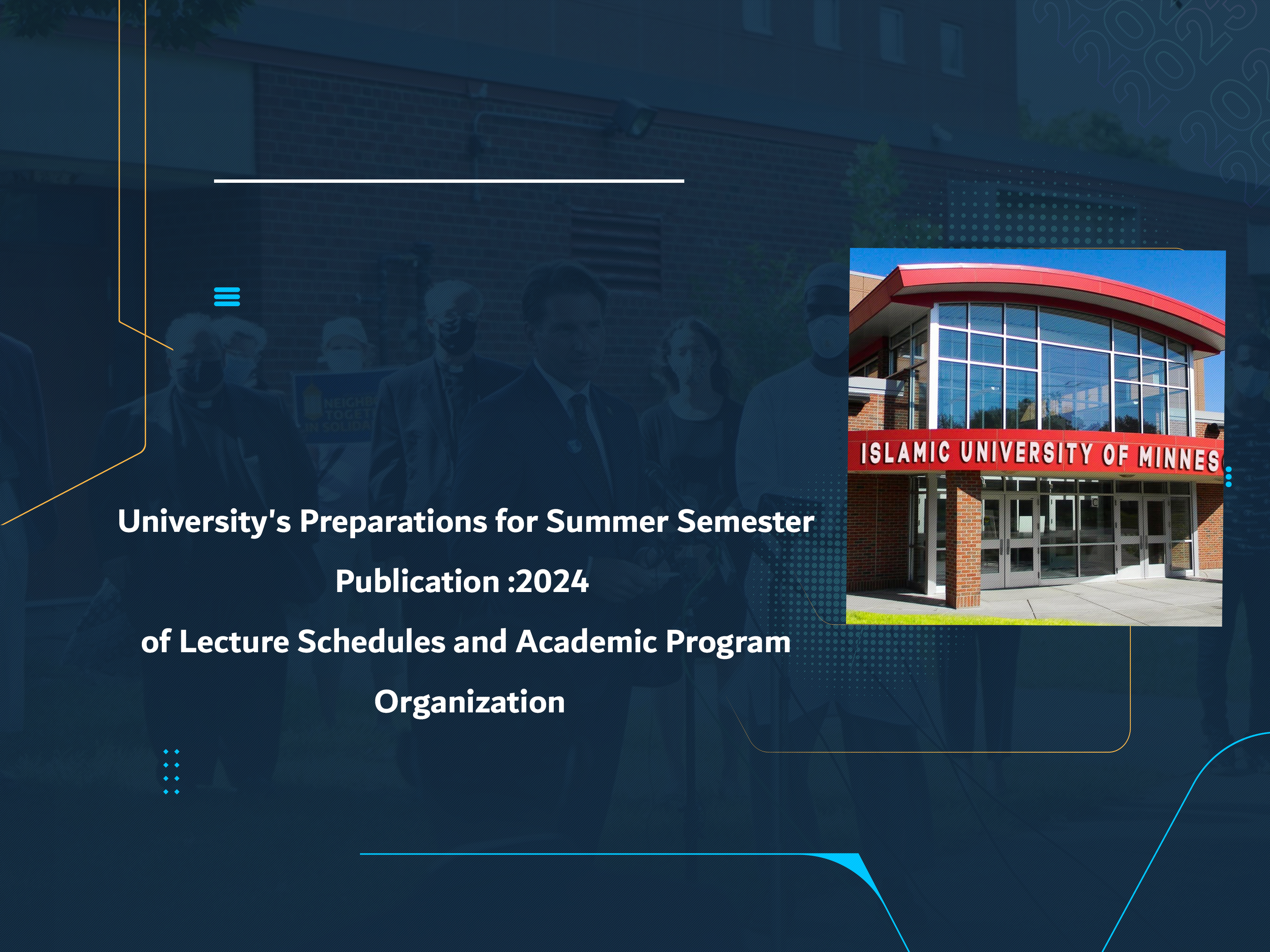University's Preparations for Summer Semester 2024: Publication of Lecture Schedules and Academic Program Organization

The summer semester at the main campus of the Islamic University of Minnesota commenced on Saturday, 11th Shawwal 1445 AH, corresponding to 20th April 2024. The Media Center published the lecture schedules for all departments in the seven colleges after comprehensive preparations that took place during the break. The preparations involved preparing lecture schedules, organizing academic programs, and determining study paths. The administrative units and supporting faculties coordinated and prepared to ensure a smooth start to the educational process.
- Registration open until 20th Shawwal:
Around 240 students from various countries registered for the summer semester. They were provided with academic numbers and login credentials for the online portals. Registration remains open until the 20th of Shawwal.
- Appointments and directives:
Several new professors were appointed in various colleges, and directives were issued by the Deanship of Faculty Affairs regarding the supervision of deans and department heads on academic research and the mechanism for appointing faculty members at the university.
- Electronic monitoring system:
An electronic monitoring system was developed for the summer semester lectures, allowing deans and department heads to directly monitor the lectures. A meeting was held for the Council of Department Heads to explain the new system and its benefits in terms of saving effort and time.
- Monitoring, Follow-up, and Verification:
Regarding the fourth supporting deanery, which is the Deanery of Student Affairs, Dr. Zainab Basiouni, the dean, confirmed that the deanery has finalized the schedules for undergraduate and graduate programs and posted them on the electronic portal in coordination with the technical support units. The deanery also distributed the curricula to the concerned faculty members and administrators and facilitated the accommodation of new students in their respective colleges and majors.
Dr. Zainab Basiouni emphasized that the deanery has coordinated with other relevant parties in preparing for the graduate phase, dividing it into two stages: the master's stage and the doctoral stage. She also highlighted the deanery's role in administering complementary exams for failing students and those with valid excuses, and emphasized that the deanery has been continuously verifying student data in the portal, WhatsApp groups, and files.
- Links, Regulations, Coordination, and Verification:
In terms of administrative units, we begin with the Virtual Rooms Unit, where the director, Engineer Mohammed Abduljawad, stated that the unit initially prepared draft schedules and sent them to college deans and department heads to nominate lecturers and determine their timings. These were followed up by department heads in collaboration with the Academic Affairs and administrative staff of the colleges, and they were completed.
Engineer Mohammed Abduljawad added that the doctoral phase, at this stage, was undergoing a plan change through the Curriculum Unit. The new plan was received, and schedules were completed for departments that have courses in the summer semester. These schedules were sent to the colleges for lecturer nominations, and by the grace of Allah, nominations were successfully completed.
Engineer Mohammed Abduljawad continued, "We have prepared the class schedules after adjusting them for Zoom rooms and preparing lecture links for these courses. The number of links for preparing lectures on Zoom reached 125 links. The schedules were uploaded to Google Drive, and the links were sent to the colleges for review and feedback.
Regarding operational links, we have set up links for starting the Spanish and French language courses, and coordination is underway to start the Western language course.
- Hot Administrative Updates:
The preparations for the summer semester at the university have been monitored by Dr. Norhan Salama, the Director of the Administrative Affairs Unit for Colleges and the Deputy Dean for Faculty Affairs. Salama coordinated the department schedules and ensured the completion of the schedule form, in addition to following up on modifications and coordinating with the Virtual Rooms Unit.
Salama also mentioned that she followed up with the Curriculum and Syllabi Unit in receiving the curricula and delivering them to department heads.
In the context of the Faculty Affairs Deanship, Salama received new faculty members, updated the database, and sent them introductory files. She also followed up on resignations and appointments with the Dean of Faculty Affairs.
- The Secretary-General of the Secretariats:
Regarding the administrative units, Dr. Jumana Al-Kharashi, the Director of the Educational Affairs Unit, confirmed holding a meeting with the director of the Virtual Rooms Unit to coordinate regarding the schedules and arrangement of joint courses. Coordination was also done with Student Affairs regarding the add/drop mechanism and preparing lectures, materials, and students on the electronic portal.
- Success is in the Details:
Various administrative units, such as the Undergraduate Student Affairs Unit, Graduate Student Affairs Unit, Technical Support Unit, and others, confirmed that the necessary tasks have been carried out for the start of the summer semester. These tasks included preparing student schedules, identifying equivalencies, uploading lectures to the electronic portal, organizing orientation meetings for new students, determining study paths for graduate studies, and adding lectures and finalizing schedules.
- The University's Vital Cell:
The Media Center plays an important role in meeting the needs of both the academic and administrative sectors in each semester. The successful organization of the summer semester at the university is achieved through the coordination and efforts of various administrative units and administrative staff. Department schedules were monitored, forms were filled, and curricula were delivered to academic departments. New faculty members were also received, the database was updated, and introductory files were sent. Schedules and arrangements were coordinated for joint courses, and coordination was done with Student Affairs regarding the add/drop mechanism and preparing lectures, materials, and students on the electronic portal.


